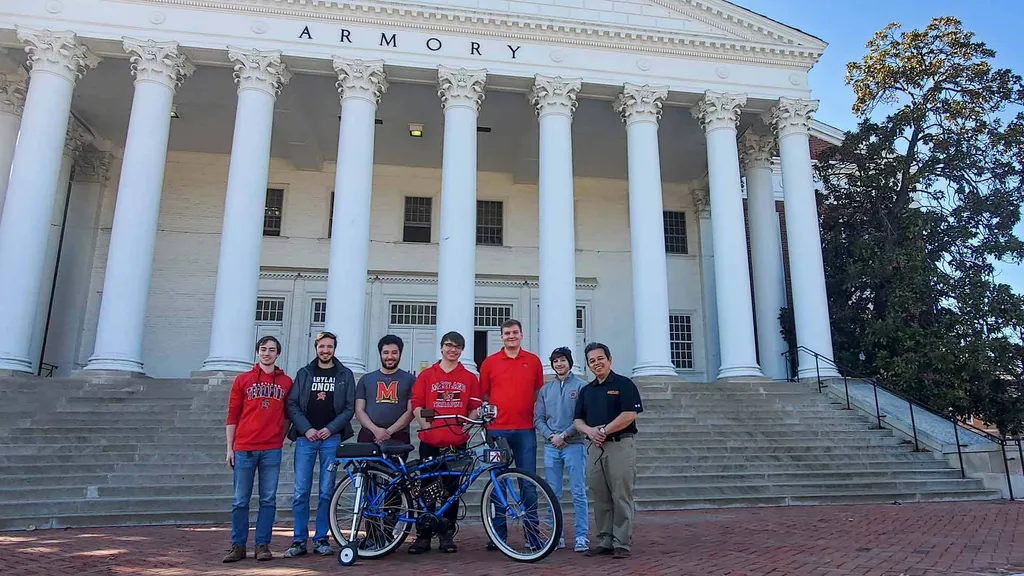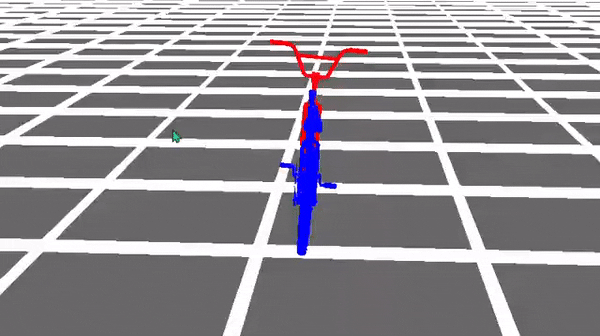- April 08, 2022
- By Shannon Clark M.Jour. ’22
If you’ve ever sprinted to the bikeshare rack in hopes of getting an electric-powered push to help you make it to class on time, the last thing you want to find is e-bike emptiness. But what if, as you stood there, a riderless bike silently glided up for you to hop on? Would you think it’s haunted … or just be grateful?
An undergraduate team in the University of Maryland’s Gemstone Honors Program is working to make this vision of autonomous bike return a reality. Over the last four years, Team Autocycle has developed a self-balancing and self-navigating prototype, and will present it at the program’s annual Thesis Conference today.
“Imagine you have 10 minutes between classes; it seems really inconvenient if your (return) hub is on the other side of campus,” said Evan Ruderman ‘22, an aerospace engineering major. “We thought it would be fun if you could call up a bike to (your location), and the idea sprung from there.”

In researching the idea, the team found a similar issue for bike-sharing companies in China, where a lack of bike hubs resulted in discarded bikes clogging the streets. To combat the issue, bike sharing companies have had to send out collection trucks to return the bikes, defeating the purpose of eco-friendly transportation.
With Autocycle, bike return would be simplified. Guided by a small computer, the bike interprets code from a mapping system to leave the hub and reach the next user, or vice versa. The bike has microprocessors running the firmware to center it as the bike navigates and balances itself until it reaches the bike rider.
“The bike is constantly monitoring its orientation using an inertial measurement unit. It’s trying to find which way is down via gravity and it knows how fast it is rotating in any given direction,” said Mikhail Khrennov ‘22.
While it may seem odd to imagine a bike peddling itself down the road, the team believes this form of technology won’t be too shocking.
“Given everything else that's rolled out in the world of technology within people's lives nowadays, I don’t think it’s pretty far out,” said Khrennov.
As the team gears up for graduation in May and leaves its research and prototype to Gemstone for future teams to potentially further Team Autocycle’s work, mentor and Keystone Professor of Electrical and Computer Engineering Romel Gomez said it’s been satisfying to see the members achieve something so difficult.
“I think quite honestly most people would have just given up, but the team was steadfast in their ambition,” he said.
Along with Team Autocycle, 11 other Gemstone teams are presenting their work today at the Gemstone Thesis Conference, where senior teams present and defend their research in front of an audience, including a panel of experts.
- Team Brain is looking to correlate biomarker levels and lifestyle choices with the progression of Alzheimer’s disease.
- Team Change focuses on revolutionary gene editing technology to correct genetic defects associated with Huntington's disease.
- Team Flow aims to add to the body of literature on sexual health and menstrual education, particularly in the United States.
- Team Gecko is developing a 3D-printed adhesive system through magnetic ink.
- Team Lemma is working to create a mathematical model that can capture the spread of extremist ideologies over social media.
- Team Mind uses deep learning models to identify neurophysiological features associated with psychiatric disorders.
- Team Mutate is trying to create a universal flu vaccine using plants to grow antigens instead of the currently accepted method, chicken eggs.
- Team Pass is working to design an online user authentication scheme that is more secure, usable and deployable than traditional passwords.
- Team Print is working on technology to repair 3D-printed structures with in situ conformal 3D printing.
- Team Produce is developing an active packaging food system—a biodegradable product to manipulate foods’ molecular structure to increase shelf life and cut waste.
- Team Reach is exploring the relationship between mental workload and performance during long-term learning of a novel motor task.
